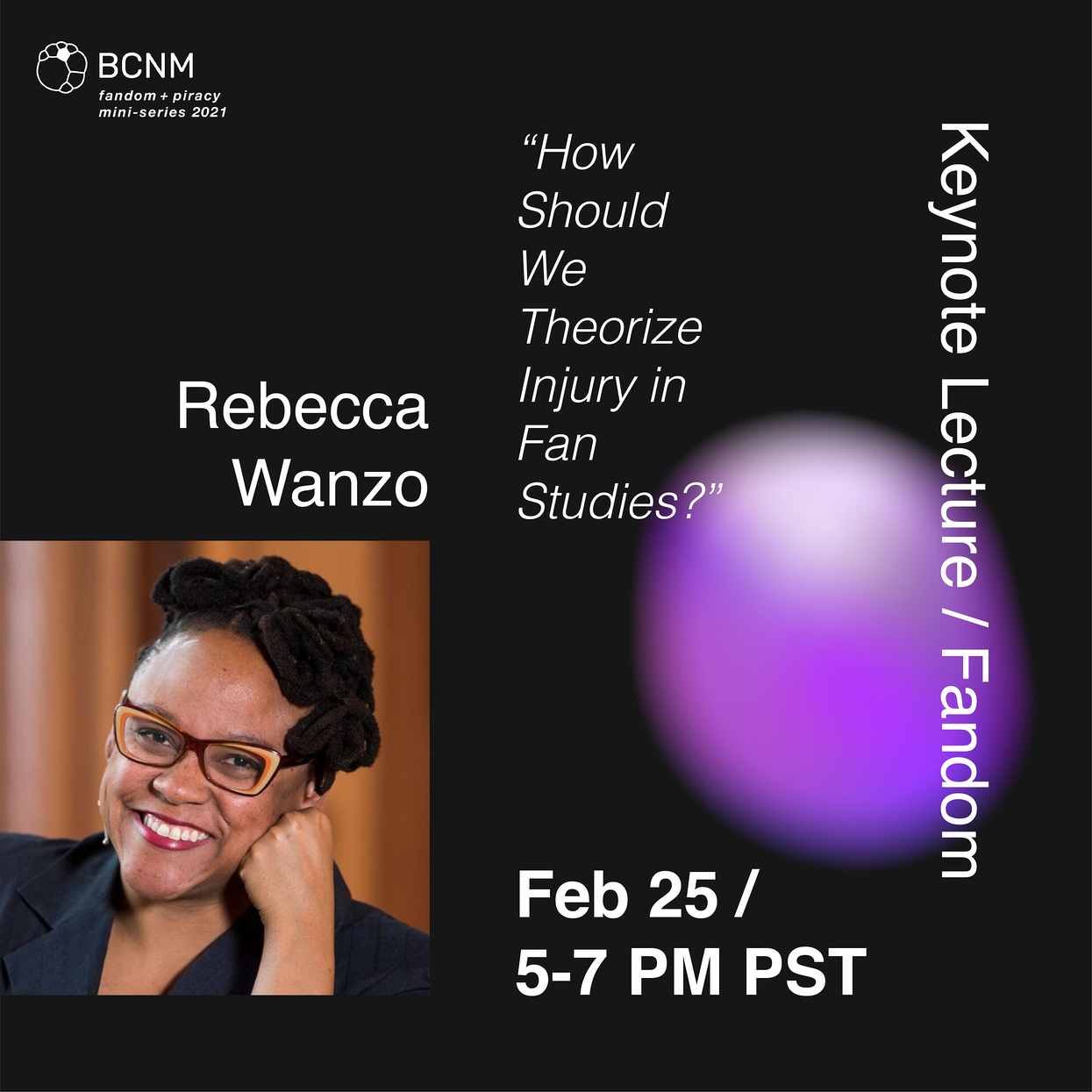Fandom + Piracy Keynote: “How should we theorize injury in fan studies?”

How should we theorize injury in fan studies?
Fandom Keynote Lecture by Rebecca Wanzo, Professor and Chair of the Department of Women, Gender, and Sexuality Studies at Washington University in St. Louis
Fandom + Piracy website here.
Register for the Zoom link here!
Or stream via YouTube at https://youtu.be/ly0UtponOn0
The series will be recorded and available on BCNM's YouTube channel. Note: We will only be sharing the recording of the Q&A portion of Rebecca Wanzo's Keynote Lecture.
Video and Transcript Now Online
Click here to watch the recorded lecture.
Click here to view the transcript of the Q&A portion.
Perhaps no issue makes disciplinary differences in approaches to the popular transparent like the question of injury. In Fan Studies, scholars are very attentive to the agency of fans and concerned about reductive characterizations of them, just as fans are attentive to dismissive interpretations of their love objects. Fans and media studies scholars more broadly push against causal claims about the injuriousness of popular culture that are more common in the social sciences, as such scholarship rarely without examines the transformational and utopian work of the popular. This talk takes as a case study a popular text in which accounts of injuriousness came from multiple directions: the HBO limited series Watchmen. Damon Lindelof called the show “a very expensive bit of fanfic,” and for some fans of the original comic book, the injury was the emphasis on race and social justice. Many fans were also sympathetic to comic book writer Alan Moore’s understandable objections to constant infringement on his intellectual property by the publishers. For some descendants of the Greenwood Massacre, the writers were guilty of cultural theft. And for others, the political discourse of the show was injurious because of its casting of a Black woman as a police officer and the treatment of reparations. In this talk I will explore how injury is just as important as pleasure in our understanding of the role of the popular in our lives, and discuss how competing injuries often structure evaluations of the popular text’s value.
Interlocutors:
Grace Gipson, Assistant Professor of African American Studies at Virginia Commonwealth University.
Malika Imhotep, Ph.D candidate in African American Studies at University of California, Berkeley.
Patrick Johnson, Assistant Professor of American Multicultural Studies at Sonoma State University.
Hosted by Abigail De Kosnik, Associate Professor in the Berkeley Center for New Media and the department of Theater, Dance and Performance Studies at University of California, Berkeley.
About Virtual Mini-Series Fandom & Piracy 2021
Fandom + Piracy website here.
Fandom and piracy are two modes of countercultural computing, alternative media, distributed creativity, and copying culture. While critics have often characterized them as illegitimate or even criminal, fandom and piracy have played a crucial role in the evolution of the Internet. Though marginalized by the media industries, legal establishment, and academia, the work of fans and pirates is central to how we interact with media.
In this conference mini-series, we will hear from scholars whose work enables us to understand how fandom and piracy have attracted millions of participants and become akin to social movements, how they have given rise to digital platforms that both augment and defy the corporatization of media production and the web, and how race/ethnicity, gender, and sexuality operate within fan and pirate communities.
This event will consist of two keynote lectures and two panels taking place online on four consecutive Thursdays (February 25, March 4, March 11, and March 18, 2021).
About Rebecca Wanzo
Rebecca Wanzo is the author of The Suffering Will Not Be Televised: African American Women and Sentimental Political Storytelling (SUNY Press, 2009), which uses African American Women as a case study in exploring the kinds of storytelling conventions of people must adhere to for their suffering to be legible to various institutions in the United States. Her most recent book, The Content of Our Caricature: African American Comic Art and Political Belonging (NYU Press, 2020) examines how Black cartoonists have used racialized caricatures to criticize constructions of ideal citizenship, as well as the alienation of African Americans from such imaginaries.
Her research interests include African American literature and culture, critical race theory, fan studies, feminist theory, the history of popular fiction in the United States, cultural studies, theories of affect, and graphic storytelling. She has published in venues such as American Literature, Camera Obscura, differences: A Journal of Feminist Cultural Studies, Signs, Women and Performance, and numerous edited collections. She has also written essays for media outlets such as CNN, the LA Review of Books, and Huffington Post.
Accessibility
BCNM events are free and open to the public. All of our events for the 2020-2021 academic year will be held on Zoom in English, in Pacific Standard Time (PST). We provide live-captioning in Zoom and offer a separate Streamtext window for live-captioning with options to customize text size and display. We strive to meet any additional access and accommodation needs. Please contact info.bcnm [at] berkeley.edu with requests or questions.
BCNM is proud to make conversations with leading scholars, artists, and technologists freely available to the public. Please help us continue this tradition by making a tax-deductible donation today. If you are in the position to support the program, we suggest $5 per event, or $100 a year.
